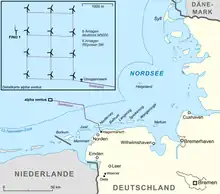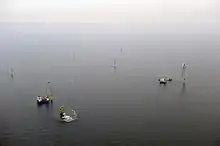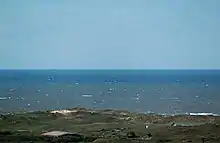| Alpha Ventus | |
|---|---|
 Aerial view of Alpha Ventus wind park (May 2012) | |
| Country |
|
| Coordinates | 54°00′40″N 6°36′28″E / 54.0112°N 6.6078°E |
| Status | Operational |
| Commission date |
|
| Owner(s) |
|
| Wind farm | |
| Type | |
| Rotor diameter |
|
| Power generation | |
| Units operational | 12 × 5 MW |
| Make and model | Adwen Adwen AD 5-116 (6) Senvion REpower 5M (6) |
| Nameplate capacity |
|
| Capacity factor | 50 - 55% (2011 & 2012) |
| External links | |
| Website | www |
| Commons | Related media on Commons |


Alpha Ventus Offshore Wind Park (before renaming known as Borkum West Offshore Wind Park) is a German offshore wind farm. This is Germany’s first offshore wind farm. It is situated in the North Sea, 45 kilometres (28 mi) north of the island of Borkum.
History

The application for construction of the wind farm near Borkum was submitted in 1999. The permit was given by the Federal Maritime and Hydrographic Agency in 2001. In 2007, contracts for supplying wind turbines were signed with REpower and Multibrid (later: Areva Wind and Adwen). That same year, a contract for the construction of a subsea cable connection to the German grid was signed. Construction of the alpha ventus substation started in July 2008. On 15 July 2009 the first wind turbine was installed and the first six turbines delivered by Multibrid went operational in August 2009. Installation of another six turbines delivered by REpower started in September 2009.[1] The foundations for the Multibrid turbines were so called tripods designed by OWT. The foundations for the REpower turbines were developed and designed by OWEC Tower. Construction of the wind farm was completed on 16 November 2009 after a seven-month construction period. On 27 April 2010 the farm was officially opened and set into commercial operation.[2]
Description
The wind farm is owned by Deutsche Offshore-Testfeld und Infrastruktur-GmbH & Co. KG, a joint venture of EWE (47.5%), E.ON (26.25%), and Vattenfall (26.25%).[3] It consists of twelve turbines, all with capacity of five megawatts. There are six Adwen AD 5-116 (former Areva Multibrid (M5000)) turbines and six REpower 5M turbines. Turbines stand in 30 m of water and are not visible from land, however they are barely visible from Norderney's lighthouse, and easily from the island of Borkum.[4] The REpower turbines are installed onto jacket foundations (OWEC Jacket Quattropods) by the crane ship Thialf and Adwen turbines are installed onto tripod-style foundations by the jack-up barge Odin.[1] In May 2010, two Multibrid generators went off service due severe overheating in their gearboxes.[5]
Due to delays, the cost of the project grew from 190 million to 250 million euro (US$270 to $357 million), or 4200 €/kW (6000 $/kW).[6][7]
In 2011, the wind farm had the highest registered capacity factor of 50.8% of most European offshore wind farms.[8][9] This was exceeded in 2012 with a capacity factor of 55%, a global record. The project team noted that the expected capacity factor of 42% was a considerable underestimation.[10][11] However, in 2013 the capacity factor was 42.7%.[12] This is likely due to other wind parks nearby being built, since wind turbines slow down the wind slightly.

Research
Because it is the first offshore wind farm in Germany, alpha ventus is accompanied by several research projects sponsored by the Federal Ministry for Environment (BMU). In 2003, the research platform FINO 1 was built approximately 400 m to the west of the wind farm. Research interests include:[13]
- investigation of the flow conditions in the wind farm
- measurement of wind and wave load
- further development and adaptation of wind turbine components to offshore conditions
- accompanying ecological research
- development of new wind farm control systems
- logistic problems and the grid integration of offshore wind farms
- Power curve test methodology[14]
- Investigation of wind turbine wakes[15]
- Assessment of the wind turbine induction zone[16]
See also
References
- 1 2 Stromsta, Karl-Erik (2009-09-30). "First REpower turbine goes up at Germany's 60MW Alpha Ventus". ReCharge. NHST Media Group. Archived from the original on 26 July 2010. Retrieved 2010-07-18.
- ↑ "Start-up celebration for offshore test field alpha ventus". Your Industry News. April 26, 2010. Retrieved 2010-04-27.
- ↑ "DOTI: the future of wind energy". EWE AG. Retrieved 2010-07-18.
- ↑ "Germany completes construction of first offshore wind farm". Monsters and Critics.com, WotR Ltd. Deutsche Presse Agentur. November 16, 2009. Archived from the original on 19 November 2009. Retrieved 2009-11-16.
- ↑ "Areva under pressure as M5000 turbines malfunction". ReCharge. NHST Media Group. 2010-06-25. Archived from the original on 29 July 2010. Retrieved 2010-07-18.
- ↑ "Germany goes offshore: EWE, E.ON and Vattenfall have constructed the first wind turbine for alpha ventus" (Press release). alpha ventus. July 15, 2009. Archived from the original on August 30, 2009. Retrieved 2009-08-18.
- ↑ "First German offshore wind farm online". Wind Daily. August 14, 2009. Retrieved 2009-08-18.
- ↑ "Capacity factor by commissioned sites". Archived from the original on 27 April 2014.
- ↑ "2011 was a great year for offshore wind". 31 October 2012. Archived from the original on 29 April 2016. Retrieved 12 July 2016.
- ↑ "Capacity factor by commissioned sites". Archived from the original on 28 July 2012. Retrieved 8 December 2012.
- ↑ Knight, Sara (29 May 2015). "Politics block German offshore wind link". Windpower Monthly. Archived from the original on 28 January 2016. Retrieved 12 July 2016.
- ↑ "Alpha Ventus capacity factor falls".
- ↑ "A Neighbour for the FINO 1 Research Platform" (PDF). DEWI Magazin. DEWI. August 31, 2007. Retrieved 2010-01-06.
- ↑ Clive, P. J. M., et al., Offshore power curve tests for onshore costs: a real world case study Archived 2014-05-12 at the Wayback Machine European Wind Energy Association Annual Conference, 2014. Retrieved: 9 May 2014.
- ↑ Gallacher, D., and More, G., Lidar measurements and visualisation of turbulence and wake decay length Archived 2014-05-12 at the Wayback Machine European Wind Energy Association Annual Conference, 2014. Retrieved: 9 May 2014.
- ↑ Asimakopoulos, M., Clive, P. J. M., More, G., and Boddington, R., Offshore compression zone measurement and visualisation Archived 2014-05-12 at the Wayback Machine European Wind Energy Association Annual Conference, 2014. Retrieved: 9 May 2014.
External links
 Media related to Alpha ventus at Wikimedia Commons
Media related to Alpha ventus at Wikimedia Commons- alpha ventus website
- Alpha Ventus Datasheet, LORC
- Alpha Ventus Datasheet, 4c
- Video of helicopter operations